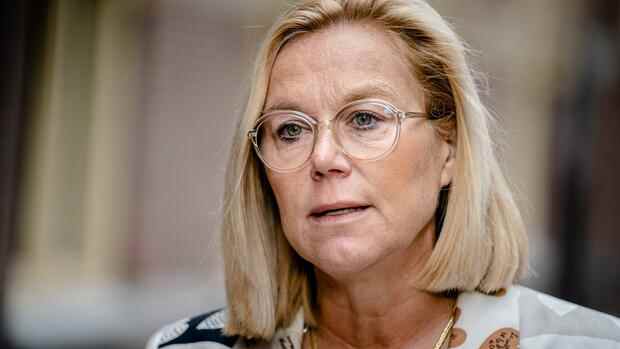With her party D66, the left-liberal could also shape the course of the Netherlands’ European policy.
(Photo: imago images/ANP)
Brussels Sigrid Kaag celebrated the success in the elections in the Netherlands with a table dance – and thus amazed the rest of Europe. Such emotional outbursts were hardly known from the disciplined Dutchmen before. Kaag may have more surprises in store for the EU.
She has been Finance Minister in the cabinet of long-time Prime Minister Mark Rutte for a month. There is already speculation in Brussels: Could Kaag’s rise herald a turnaround in the Netherlands’ European policy and help to overcome the stalemate between northern and southern Europeans in financial and economic policy?
In recent years, Kaag’s predecessor, Wopke Hoekstra, was the spokesman for those euro countries that vehemently insisted on budgetary discipline in Europe. But Hoekstra has to be content with the post of foreign minister in the new government. That has consequences.
In future, money will be looser in The Hague – as the top candidate of the left-liberal D66 party, Kaag Rutte has wrested considerable concessions from it. More money for climate protection and childcare, tax breaks for small and medium-sized businesses, a higher minimum wage: the coalition agreement bears the signature of the D66 in crucial passages.
Top jobs of the day
Find the best jobs now and
be notified by email.
The decisive question now is to what extent the domestic willingness to spend will also rub off on European politics. Expectations are high, especially in southern Europe. This year the EU wants to discuss a reform of the debt limits. Dutch officials remain cautious: “As in any new government, there will be continuity and change,” says one.
The new government is made up of Rutte’s right-wing liberal VVD, Kaag’s D66, Hoekstra’s shrunken Christian Democrats and the small CU party. She still has to get used to it, that much is clear. It only met in December, after arduous 271-day negotiations.
Presentation in the Eurogroup
For Kaag, Dutch politics is a second career. The 60-year-old spent her first time at the United Nations in several posts in the Middle East and a few years in New York. Kaag is married and has four adult children. She already gained government experience in the previous government, at that time as development minister and briefly as foreign minister.
Her husband is Palestinian and also a politician. For a time, he was deputy minister responsible for international cooperation in the Palestinian Authority.
Kaag’s first important appointment in Brussels is on Monday. She will introduce herself to the Eurogroup and outline her positions. She will also get to know Christian Lindner better, the second newcomer in the Euro Group. The relationship between Kaag and Lindner will be particularly interesting. While Kaag represents more left-wing positions under a more right-wing head of government, it’s exactly the opposite for Lindner.
Both coalitions, the Dutch and the German, see themselves as reform alliances. Much in European politics will depend on their interaction. Including the decisive question of whether the euro group will succeed in embedding the common currency in a new regulatory framework that limits national debt on the one hand and offers enough leeway for future investments on the other.
More: Dutch parties agree on coalition after months
